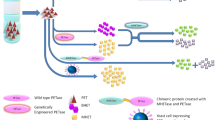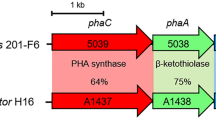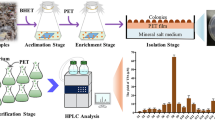Abstract
Poly(ethylene terephthalate) (PET) is a major source of plastic pollution. Biodegradation technologies are of paramount interest in reducing or recycling PET waste. In particular, a synergistic microbe-enzyme treatment may prove to be a promising approach. In this study, a synergistic system composed of Microbacterium oleivorans JWG-G2 and Thermobifida fusca cutinase (referred to as TfC) was employed to degrade bis(hydroxyethyl) terephthalate (BHET) oligomers and a high crystalline PET film. A novel degradation product that was obtained by M. oleivorans JWG-G2 treatment alone was identified as ethylene glycol terephthalate (EGT). With the addition of TfC as a second biocatalyst, the highest synergy degrees for BHET oligomers and PET film degradation were 2.79 and 2.26, respectively. The largest amounts of terephthalic acid (TPA) and mono(2-hydroxyethyl) terephthalate (MHET) (47 nM and 330 nM, respectively) were detected after combined treatment of PET film with M. oleivorans JWG-G2 at 5 × 103 μL/cm2 and TfC at 120 μg/cm2, and the degree of PET film surface destruction was more significant than those produced by each treatment alone. The presence of extracellular PET hydrolases in M. oleivorans JWG-G2, including three carboxylesterases, an esterase and a lipase, was predicted by whole genome sequencing analysis, and a predicted PET degradation pathway was proposed for the synergistic microbe-enzyme treatment. The results indicated that synergistic microbe-enzyme treatment may serve as a potentially promising tool for the future development of effective PET degradation.
Key points
• An ecofriendly synergistic microbe-enzyme PET degradation system operating at room temperature was first introduced for degrading PET.
• A novel product (EGT) was first identified during PET degradation.
• Potential PET hydrolases in M. oleivorans JWG-G2 were predicted by whole genome sequencing analysis.







Similar content being viewed by others
Data availability
Whole genome sequence of M. oleivorans JWG-G2 has been submitted to NCBI (SRX8594642). M. oleivorans JWG-G2 has been deposited in China Center for Type Culture Collection (CCTCC M2019416). Other data and materials are available from the corresponding author.
References
Auta HS, Emenike CU, Fauziah SH (2017) Screening of Bacillus strains isolated from mangrove ecosystems in Peninsular Malaysia for microplastic degradation. Environ Pollut 231:1552–1559. https://doi.org/10.1016/j.envpol.2017.09.043
Barth M, Oeser T, Wei R, Then J, Schmidt J, Zimmermann W (2015) Effect of hydrolysis products on the enzymatic degradation of polyethylene terephthalate nanoparticles by a polyester hydrolase from Thermobifida fusca. Biochem Eng J 93:222–228. https://doi.org/10.1016/j.bej.2014.10.012
Barth M, Honak A, Oeser T, Wei R, Belisário-Ferrari MR, Then J, Schmidt J, Zimmermann W (2016) A dual enzyme system composed of a polyester hydrolase and a carboxylesterase enhances the biocatalytic degradation of polyethylene terephthalate films. Biotechnol J 11:1082–1087. https://doi.org/10.1002/biot.201600008
Billig S, Oeser T, Birkemeyer C, Zimmermann W (2010) Hydrolysis of cyclic poly(ethylene terephthalate) trimers by a carboxylesterase from Thermobifida fusca KW3. Appl Microbiol Biotechnol 87:1753–1764. https://doi.org/10.1007/s00253-010-2635-y
Bollinger A, Thies S, Knieps-Grünhagen E, Gertzen C, Kobus S, Höppner A, Ferrer M, Gohlke H, Smits SHJ, Jaeger KE (2020) A novel polyester hydrolase from the marine bacterium structural and functional Insights. Front Microbiol 11:114. https://doi.org/10.3389/fmicb.2020.00114
Bordoli L, Kiefer F, Arnold K, Benkert P, Battey J, Schwede T (2009) Protein structure homology modeling using SWISS-MODEL workspace. Nat Protoc 4:1–13. https://doi.org/10.1038/nprot.2008.197
Carniel A, Valoni E, Nicomedes Junior J, Gomes AC, De Castro AM (2017) Lipase from Candida antarctica (CALB) and cutinase from Humicola insolens act synergistically for PET hydrolysis to terephthalic acid. Process Biochem 59:84–90. https://doi.org/10.1016/j.procbio.2016.07.023
Chen S, Tong X, Woodard RW, Du G, Wu J, Chen J (2008) Identification and characterization of bacterial cutinase. J Biol Chem 283:25854–25862. https://doi.org/10.1074/jbc.M800848200
Danso D, Chow J, Streit WR (2019) Plastics: microbial degradation, environmental and biotechnological perspectives. Appl Microbiol Biotechnol 85:e01095–e01119. https://doi.org/10.1128/AEM.01095-19
Delcher AL, Bratke KA, Powers EC, Salzberg SL (2007) Identifying bacterial genes and endosymbiont DNA with Glimmer. Bioinformatics 23:673–679. https://doi.org/10.1093/bioinformatics/btm009
Eberl A, Heumann S, Brückner T, Araujo R, Cavaco-Paulo A, Kaufmann F, Kroutil W, Guebitz GM (2009) Enzymatic surface hydrolysis of poly(ethylene terephthalate) and bis(benzoyloxyethyl) terephthalate by lipase and cutinase in the presence of surface active molecules. J Biotechnol 143:207–212. https://doi.org/10.1016/j.jbiotec.2009.07.008
Espino-Rammer L, Ribitsch D, Przylucka A, Marold A, Greimel KJ, Herrero Acero E, Guebitz GM, Kubicek CP, Druzhinina IS (2013) Two novel class II hydrophobins from Trichoderma spp. stimulate enzymatic hydrolysis of poly(ethylene terephthalate) when expressed as fusion proteins. Appl Environ Microbiol 79:4230–4238. https://doi.org/10.1128/aem.01132-13
Gewert B, Plassmann MM, MacLeod M (2015) Pathways for degradation of plastic polymers floating in the marine environment. Environ Sci Process Impacts 17:1513–1521. https://doi.org/10.1039/c5em00207a
Gu LT, Yan ZF, Wu J, Su LQ (2020) Screening, identification and degradation characteristics of a PET degrading strain. Mol Microbiol Res 20:1–11 http://kns.cnki.net/kcms/detail/45.1369.Q.20200428.1507.002
Kanehisa M, Furumichi M, Tanabe M, Sato Y, Morishima K (2017) KEGG: new perspectives on genomes, pathways, diseases and drugs. Nucleic Acids Res 45:D353–D361. https://doi.org/10.1093/nar/gkw1092
Karaca B, Demir A, Özdoğan E, İşmal ÖE (2010) Environmentally benign alternatives: plasma and enzymes to improve moisture management properties of knitted PET fabrics. Fibers Polym 11:1003–1009. https://doi.org/10.1007/s12221-010-1003-y
Kunststoffe GF (2019) Plastics - the Facts 2019. European
Li C, Li Y, Cheng X, Feng L, Xi C, Zhang Y (2013) Immobilization of Rhodococcus rhodochrous BX2 (an acetonitrile-degrading bacterium) with biofilm-forming bacteria for wastewater treatment. Bioresour Technol 131:390–396. https://doi.org/10.1016/j.biortech.2012.12.140
Li ZY, Wei R, Gao MX, Ren YR, Yu B, Nie KL, Xu HJ, Liu L (2020) Biodegradation of low-density polyethylene by Microbulbifer hydrolyticus IRE-31. J Environ Manag 263:110402. https://doi.org/10.1016/j.jenvman.2020.110402
Nimchua T, Eveleigh DE, Punnapayak US (2008) Screening of tropical fungi producing polyethylene terephthalate-hydrolyzing enzyme for fabric modification. J Ind Microbiol Biotechnol 35:843–850. https://doi.org/10.1007/s10295-008-0356-3
Noda F, Hayashi K, Mizunuma T (1980) Antagonism between osmophilic lactic acid bacteria and yeasts in brine fermentation of soy sauce. Appl Environ Microbiol 40:452–457. https://doi.org/10.1016/0141-4607(80)90006-2
Nowak B, Pająk J, Labuzek S, Rymarz G, Talik E (2011) Biodegradation of poly(ethylene terephthalate) modified with polyester “Bionolle®” by Penicillium funiculosum. Polimery 56:35–44. https://doi.org/10.14314/polimery.2011.035
Ronkvist AM, Xie W, Lu W, Gross RA (2009) Cutinase-catalyzed hydrolysis of poly(ethylene terephthalate). Macromolecules 42:5128–5138. https://doi.org/10.1021/ma9005318
Sinha V, Patel MR, Patel JV (2010) Pet waste management by chemical recycling: a review. J Polym Environ 18:8–25. https://doi.org/10.1007/s10924-008-0106-7
Tatusov RL, Fedorova ND, Jackson JD, Jacobs AR, Kiryutin B, Koonin EV, Krylov DM, Mazumder R, Mekhedov SL, Nikolskaya AN, Rao BS, Smirnov S, Sverdlov AV, Vasudevan S, Wolf YI, Yin JJ, Natale DA (2003) The COG database: an updated version includes eukaryotes. BMC Bioinforma 4:41. https://doi.org/10.1186/1471-2105-4-41
Wei R, Zimmermann W (2017a) Biocatalysis as a green route for recycling the recalcitrant plastic polyethylene terephthalate. Microb Biotechnol 10:1302–1307. https://doi.org/10.1111/1751-7915.12714
Wei R, Zimmermann W (2017b) Microbial enzymes for the recycling of recalcitrant petroleum-based plastics: how far are we? Microb Biotechnol 10:1308–1322. https://doi.org/10.1111/1751-7915.12710
Yang Y, Chen J, Wu WM, Zhao J, Yang J (2015) Complete genome sequence of Bacillus sp. YP1, a polyethylene-degrading bacterium from waxworm’s gut. J Biotechnol 200:77–78. https://doi.org/10.1016/j.jbiotec.2015.02.034
Yang T, Liao MD, Liu SJ, He YG, Lin ZF (2016) Study on feather degradation by microbe-enzyme system. China Feed 3:14–16. https://doi.org/10.15906/j.cnki.cn11-2975/s.20150304
Yoshida S, Hiraga K, Takehana T, Taniguchi I, Yamaji H, Maeda Y, Toyohara K, Miyamoto K, Kimura Y, Oda K (2016) A bacterium that degrades and assimilates poly(ethylene terephthalate). Science 351:6278. https://doi.org/10.1126/science.aaf8625
Authorswere predicted
All authors have contributed to the manuscript. ZFY: data curation, writing-original draft. LW: data curation. WX: data curation. ZZL: writing-review & editing. LTG: data curation. JW: conceptualization, writing-original draft. All authors revised and approved the final manuscript.
Funding
This work was supported by the National Key Research and Development Program of China (2019YFA0706900) and Jiangsu Provincial Science and Technology Department Policy Guidance Program-International Cooperation Projects-Innovation cooperation project of “B&R” (No. BZ2020010).
Author information
Authors and Affiliations
Corresponding author
Ethics declarations
Conflict of interest
The authors declare that they have no conflict of interest.
Ethical approval
This article does not contain any studies with human participants performed by any of the authors.
Additional information
Publisher’s note
Springer Nature remains neutral with regard to jurisdictional claims in published maps and institutional affiliations.
Supplementary information
ESM 1
(PDF 698 kb)
Rights and permissions
About this article
Cite this article
Yan, ZF., Wang, L., Xia, W. et al. Synergistic biodegradation of poly(ethylene terephthalate) using Microbacterium oleivorans and Thermobifida fusca cutinase. Appl Microbiol Biotechnol 105, 4551–4560 (2021). https://doi.org/10.1007/s00253-020-11067-z
Received:
Revised:
Accepted:
Published:
Issue Date:
DOI: https://doi.org/10.1007/s00253-020-11067-z




